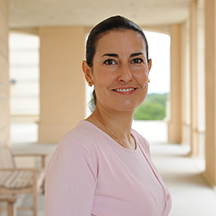Guadalupe Carmona, PhD

Dr. Guadalupe Carmona is Executive Director of ConTex, a joint initiative of the The University of Texas System and Mexico’s National Council of Science and Technology (Conacyt) to foster binational research and academic collaborations between Texas and Mexico. She is also Professor of STEM Education at The University of Texas at San Antonio.
Dr. Carmona’s research agenda has focused on preparing the next generation of students to have access to the fundamental ideas in STEM from early ages, and broadening participation in STEM to all students. A native of Mexico, Dr. Carmona received a PhD in Mathematics Education from Purdue University, a MSc in Mathematics Education from CINVESTAV-Mexico, and BSc in Mathematics from ITAM-Mexico. For more than 20 years, her research has focused on the design, implementation, and evaluation of innovation and technology-supported educational reforms in STEM education in national and international settings. She also conducts research on formative assessment of student learning that takes place in the classroom, and how the use of these practices and indicators can be extended at a large-scale
Dr. Carmona has secured more than $12M in external funding. She is currently principal investigator for the international Campus Viviente in STEM Education Project and UTSA’s P20 Pathways to Education Research Training Program, funded by the U.S. Institute for Education Sciences. She’s co-principal investigator of UTSA’s Center for Security and Privacy Enhanced Cloud Computing (C-SPECC), funded by the National Science Foundation. She is leading authority on the use of mathematics modeling activities for assessment of student learning and has served as member of the advisory board for the Educational Testing Service’s Cognitively Based Assessment and for Learning (CBAL)-Mathematics.
Her work has been translated to different languages and has extended to countries including Mexico, the United States, Chile, Costa Rica, Saudi Arabia, Turkey, and Greece. Dr. Carmona’s work has directly impacted more than 20,000 students, 150 teachers, and dozens of researchers.

